10 best WooCommerce alternatives to power your online store in 2025

Stevia Putri
Last edited August 25, 2025

So, you're thinking about moving on from WooCommerce. You're definitely not the first. While it’s a powerhouse on WordPress, it's not always a smooth ride. If you've ever felt like you're juggling a dozen plugins just to get basic features, holding your breath during every update, or hitting a wall when your store starts to grow, you know exactly what I mean.
You need an ecommerce platform that does more than just show off your products. You need something that helps you grow and gives your customers a great experience, all without the technical headaches. This guide breaks down the 10 best WooCommerce alternatives for 2025. We'll look at everything from all-in-one platforms to different WordPress plugins, helping you find the right foundation for your business.
What are WooCommerce alternatives?
First off, "WooCommerce alternatives" isn't just one type of tool. It's a catch-all term for any platform that lets you sell online without, well, WooCommerce. They generally fall into a few camps:
- Hosted ecommerce platforms (SaaS): These are all-in-one services like Shopify or BigCommerce. You pay a monthly fee, and they handle the technical stuff ,hosting, security, and updates. They’re a great choice if you’d rather focus on your business than on backend maintenance.
- Alternative WordPress plugins: If you like WordPress but are just done with WooCommerce, tools like SureCart or Easy Digital Downloads can take its place. They often offer a cleaner or more specialized way to sell directly from your existing site.
- Open-source software: For anyone who wants total control, platforms like PrestaShop or Adobe Commerce are self-hosted. You get complete freedom to customize everything, but this route requires some serious technical skills (or the budget to hire someone who has them).
The right one for you really boils down to your budget, how comfortable you are with tech, and your long-term plans.
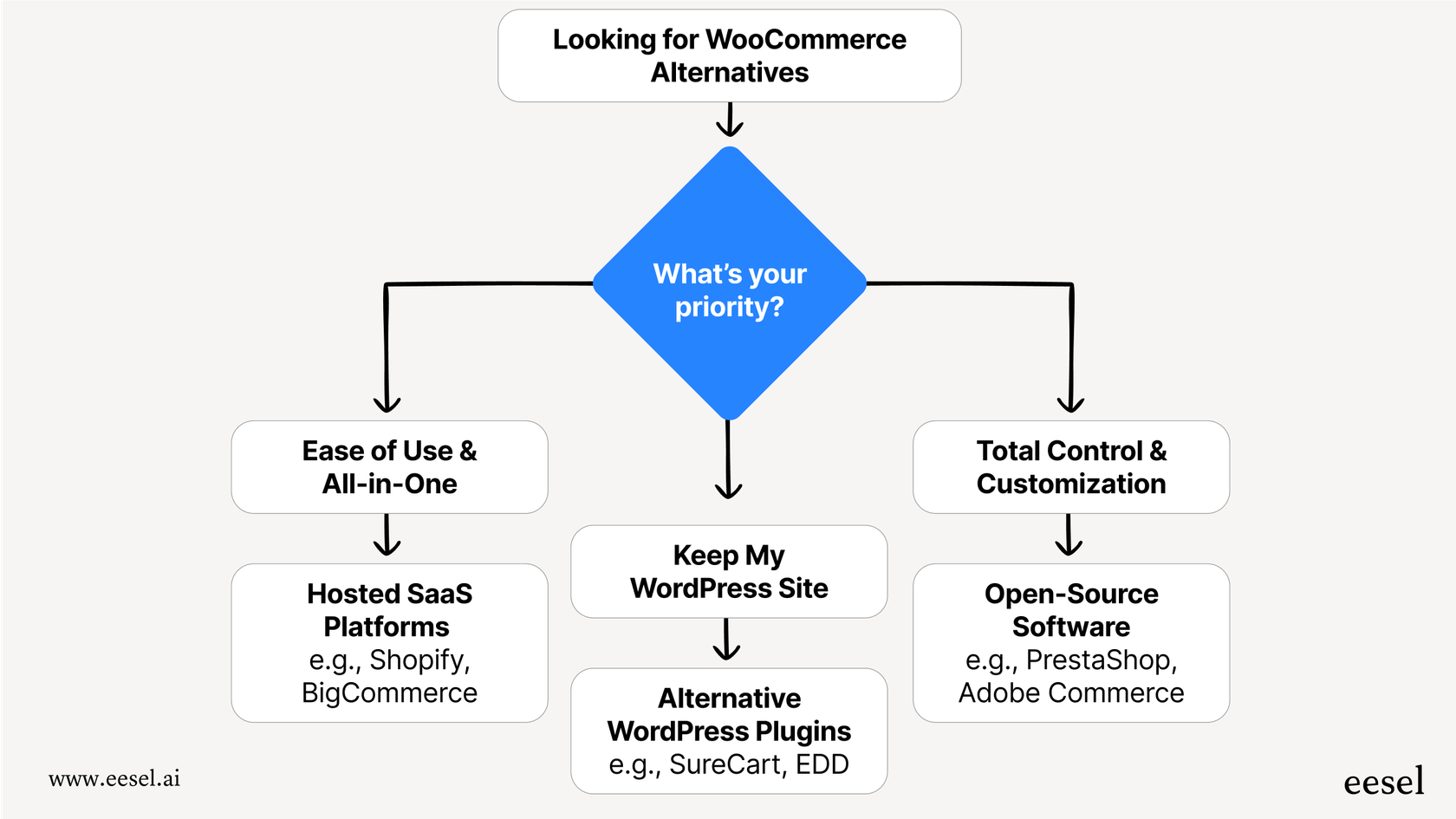
How we chose the best WooCommerce alternatives
To put this list together, we didn't just pick the most popular names. We looked at each platform based on what really matters when you're in the trenches running an online store.
- Is it easy to use? We considered how fast you can get a store running without wanting to throw your computer out the window. We looked at the setup, daily management, and the general learning curve for non-developers.
- Can it grow with you? We checked for the built-in tools you need to manage inventory, run marketing campaigns, and sell across different channels. A platform should support your growth, not hold it back.
- What's the real cost? We looked beyond the sticker price. Monthly fees, transaction charges, and the cost of essential apps were all considered to get a sense of the total cost of ownership.
- How's the support (for you and your customers)? We looked at the platform's own support and, just as important, how well it works with modern AI tools. Using something like eesel AI can help automate customer service and create an experience that keeps people coming back.
Comparison of the best WooCommerce alternatives
Here’s a quick side-by-side look at our top picks.
| Platform | Type | Best For | Starting Price | Key Support Feature |
|---|---|---|---|---|
| Shopify | SaaS | All-in-one solution for all business sizes | $29/month | Integrated help desk & large app ecosystem |
| BigCommerce | SaaS | Scaling B2B and enterprise businesses | $39/month | Strong multi-storefront and B2B features |
| Wix | SaaS | Small businesses and visual-first brands | $27/month | Easy-to-use drag-and-drop builder |
| Squarespace | SaaS | Creatives, artists, and lifestyle brands | $23/month | Beautiful, design-focused templates |
| SureCart | WordPress Plugin | WordPress users wanting a simple, all-in-one plugin | Free plan available | Secure, hosted checkout & no plugin conflicts |
| Easy Digital Downloads | WordPress Plugin | Selling digital products on WordPress | $99.50/year | Focused toolset for digital goods |
| Ecwid | SaaS / Plugin | Adding ecommerce to an existing website | Free plan available | Embeddable on any site or social media |
| Adobe Commerce | Open-Source | Large enterprises with complex needs | Quote-based | Unmatched customization and scalability |
| PrestaShop | Open-Source | International sellers needing localization | Free (self-hosted) | Built-in support for 75+ languages |
| Square Online | SaaS | Retailers unifying online and in-person sales | Free plan available | Seamless integration with Square POS |
The top 10 WooCommerce alternatives for 2025
Let's get into the details of what makes each of these platforms a solid choice.
1. Shopify
Shopify is probably the name you know best in the all-in-one ecommerce world. If you're ready to leave WordPress behind completely, it's the most direct and powerful alternative. It's famous for being straightforward, scalable, and loaded with features from the get-go.
Best for: Businesses of all sizes looking for a powerful, scalable, and easy-to-manage hosted solution.
Key features:
- An intuitive drag-and-drop store builder and a huge library of themes.
- Shopify Payments is built-in, so you can avoid extra transaction fees from third-party processors.
- A massive app store with over 8,000 apps to add almost any functionality you can think of.
- An integrated POS system for selling both online and in person.
Pricing: Plans start at $29 per month for the Basic plan.
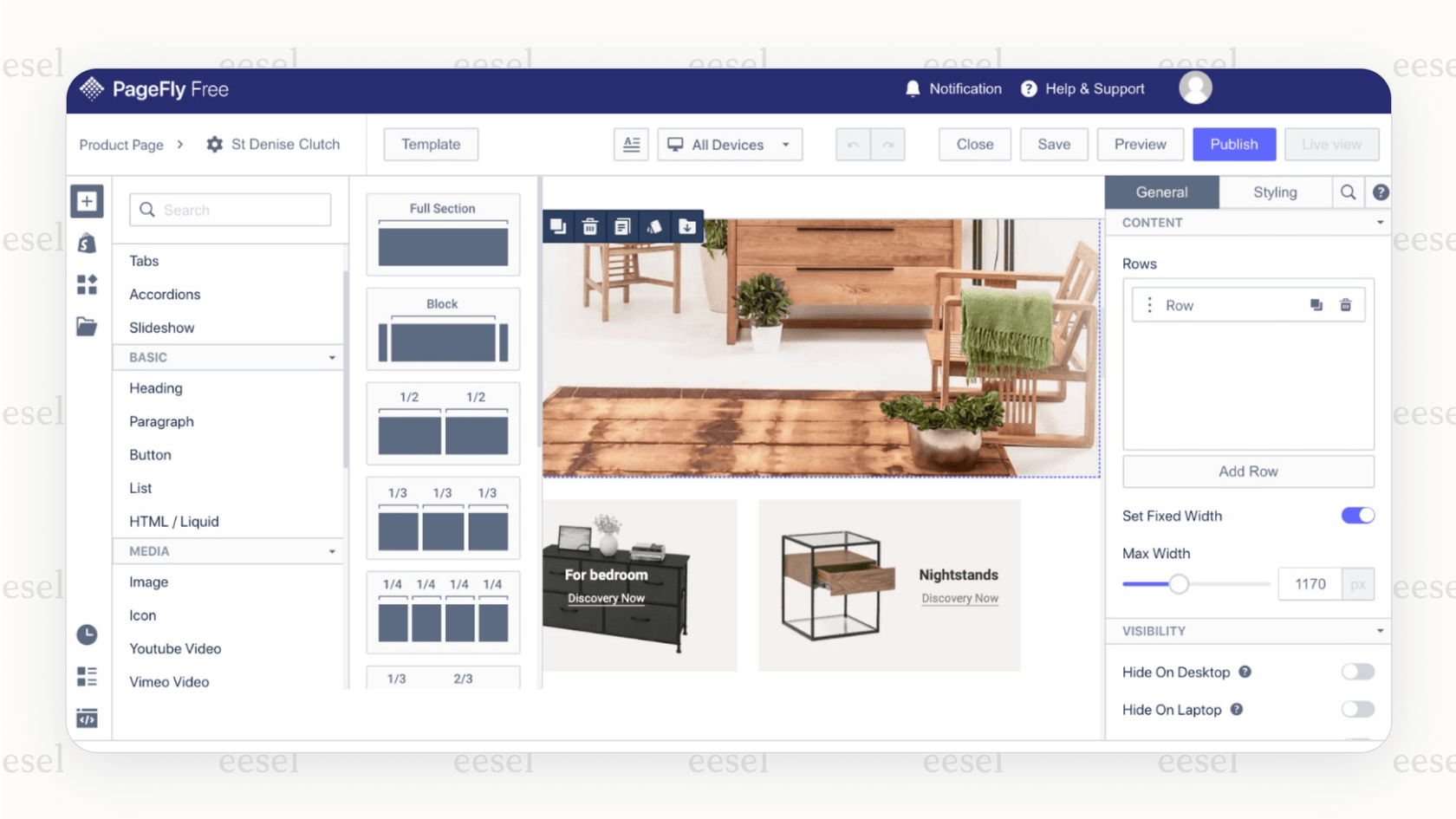
Making support smarter with AI: Shopify has its own help desk, but for truly responsive, 24/7 support, adding a dedicated AI tool can make a huge difference. eesel AI connects with your Shopify store data, training an AI Chatbot on your product details, FAQs, and help docs. This lets you automate answers to common questions about orders, products, and shipping, freeing up your team to handle the trickier stuff.
2. BigCommerce
BigCommerce is a flexible platform that’s especially good for growing businesses and those with B2B models. It stands out by including a lot of advanced features right out of the box, which means you won't have to lean so heavily on third-party apps. It’s a beast when it comes to B2B and managing multiple storefronts.
Best for: Mid-to-large businesses and B2B sellers who need powerful built-in features without the plugin headaches.
Key features:
- Zero transaction fees on all of their plans.
- Advanced tools for product filtering and visual merchandising.
- Sell in multiple currencies and languages without needing extra apps.
- A powerful API that's great for developers building custom "headless" experiences.
Pricing: Starts at $39 per month, with plans that scale up based on your annual sales.
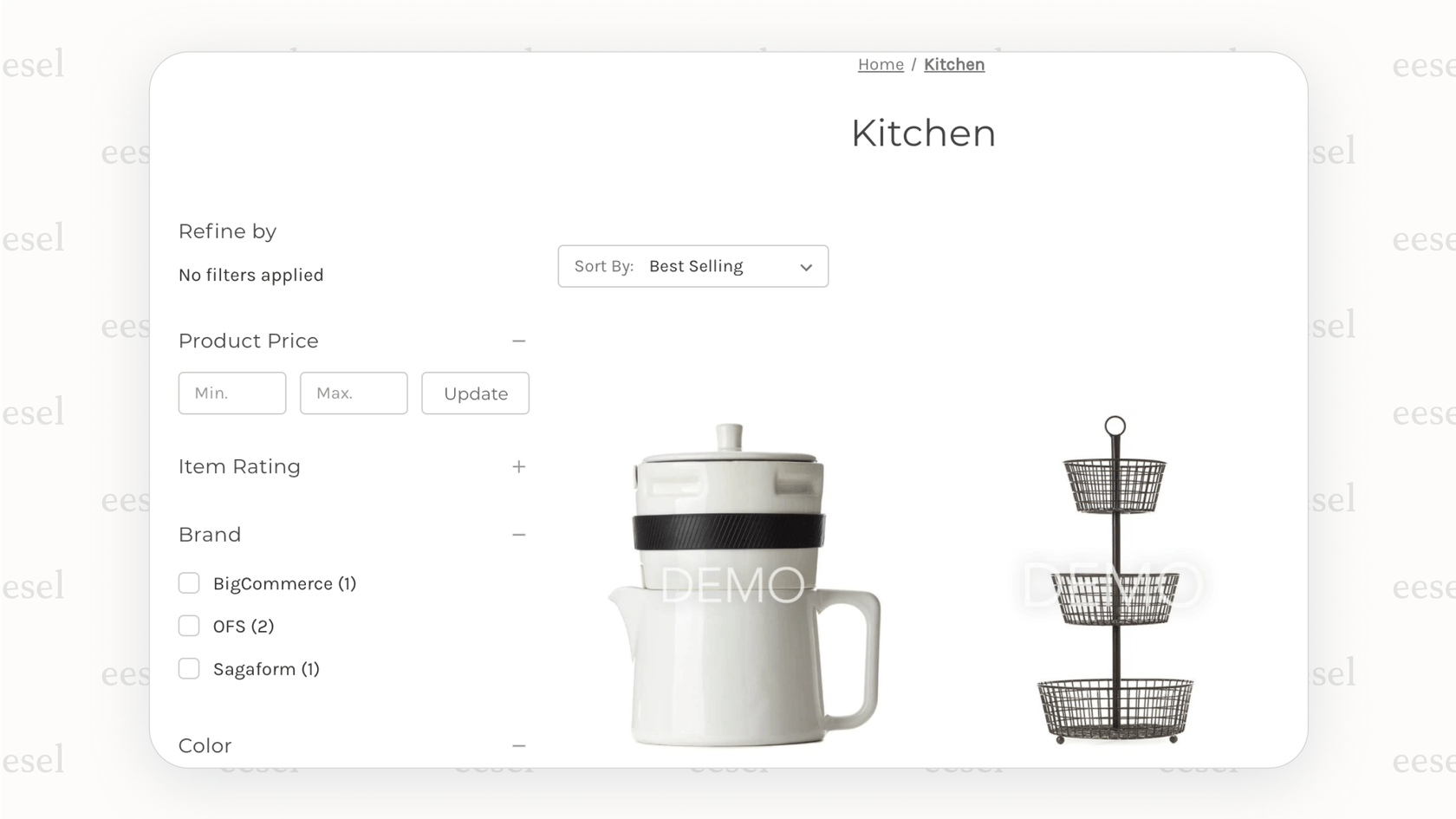
Making support smarter with AI: The powerful features of BigCommerce are great for growth, but as you scale, support requests can pile up fast. An AI solution like eesel AI can connect with your knowledge base to give instant, accurate answers. An embeddable AI Chatbot or an AI Copilot for your support agents ensures you deliver consistent help as your business expands.
3. Wix
You've probably seen a Wix ad or two. It's famous for its flexible and easy-to-use drag-and-drop website editor. Over the years, it's developed a solid ecommerce toolkit that's a great choice for small to medium-sized businesses that want full creative control.
Best for: Small businesses, artists, and entrepreneurs who value creative freedom and a visual-first approach.
Key features:
- Over 900 customizable templates and a very flexible editor.
- Built-in tools for marketing and SEO to help customers find you.
- An all-in-one platform that handles hosting, security, and all the updates.
- Wix ADI (Artificial Design Intelligence) can even build a starter site for you after you answer a few questions.
Pricing: Ecommerce plans start at $27 per month.
Making support smarter with AI: You can build a beautiful store with Wix, but managing customer questions is often a manual job. You can embed the eesel AI Chatbot right onto any Wix site. By pointing it to your FAQ pages or some Google Docs with product info, the chatbot can handle customer questions 24/7, capture leads, and pass things to a human when needed.
4. Squarespace
Squarespace is known for its stunning, design-centric templates. It offers an elegant, all-in-one platform for creative folks and lifestyle brands who need a store that looks as good as their products.
Best for: Creative professionals, designers, and lifestyle brands who care deeply about aesthetics and simplicity.
Key features:
- Gorgeous, mobile-friendly templates that look professional right away.
- Integrated tools for blogging, booking appointments, and email marketing.
- A simple and clean interface for managing inventory and orders.
- Supports physical products, digital downloads, and subscriptions.
Pricing: Commerce plans start at $27 per month.
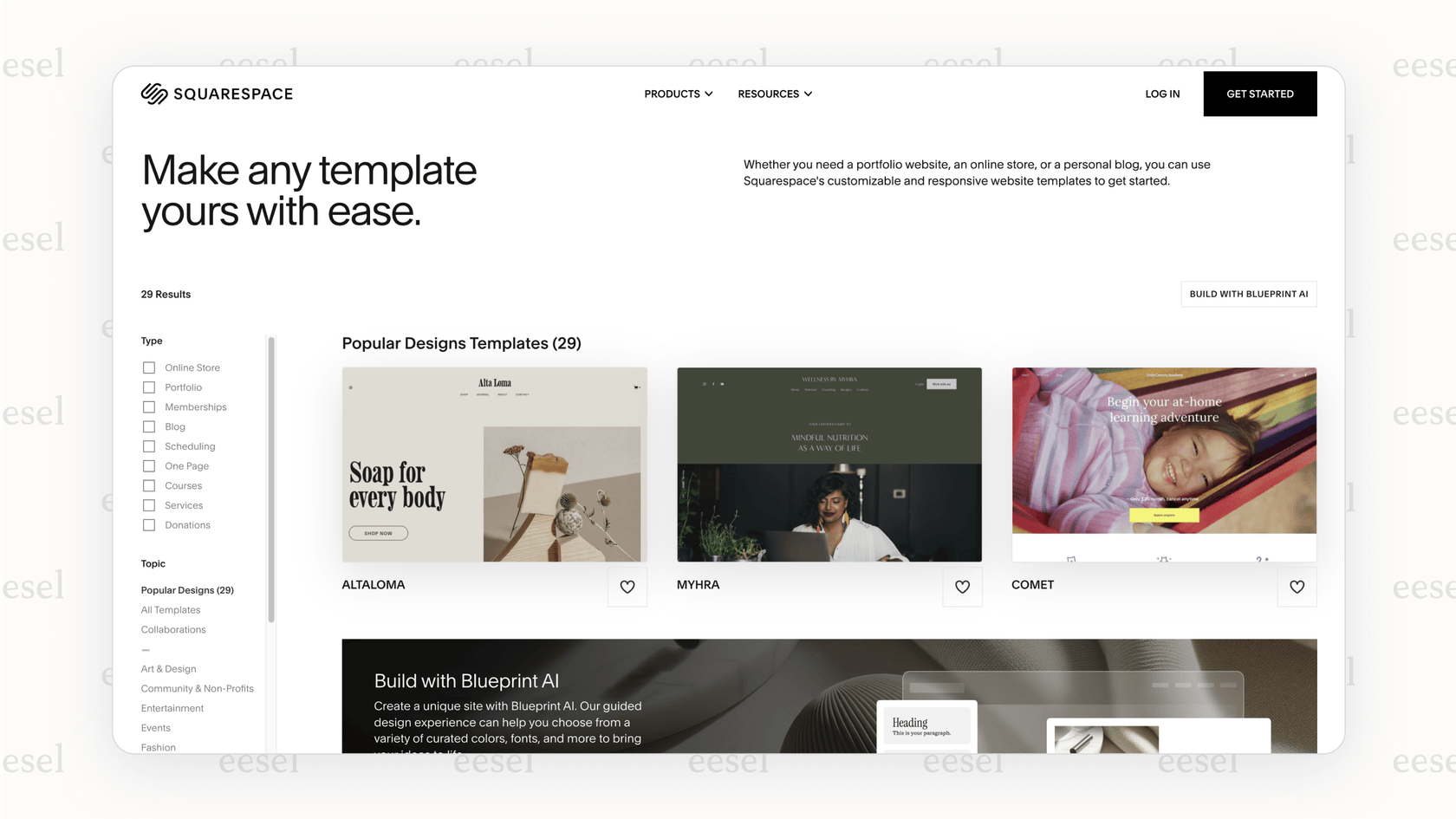
Making support smarter with AI: A beautiful Squarespace site will attract visitors, but what happens when they have questions? By embedding the eesel AI Chatbot, you can give instant answers based on your site's content. This simple addition can stop visitors from leaving and help turn casual browsers into customers, all while keeping the clean, professional vibe of your brand.
5. SureCart
SureCart is a modern, lightweight WordPress plugin built to be a simpler WooCommerce alternative. It smartly bundles most features into one plugin and uses a "headless" approach, which means it runs the checkout on its own fast and secure servers, not on your site.
Best for: WordPress users who think WooCommerce is overkill and want a fast, all-in-one plugin without the constant worry about plugin conflicts.
Key features:
- It's an all-in-one plugin, so you don't need to buy and manage dozens of add-ons.
- The checkout process is hosted by SureCart for better speed and security.
- It works smoothly with any WordPress theme or page builder you're already using.
- It natively supports subscriptions, payment plans, and digital products.
Pricing: There’s a solid free plan available, with paid plans starting at $29 per month.
Making support smarter with AI: SureCart simplifies your store's backend, and eesel AI can simplify your customer support. By connecting to your help desk (like Zendesk or Freshdesk), eesel can learn from your past support tickets. This gives your team an AI Copilot that helps them find the right answers faster, so you can offer great support on your streamlined WordPress site.
6. Easy Digital Downloads
Just like the name says, Easy Digital Downloads is the go-to WordPress plugin for selling digital goods. It provides a focused, lightweight solution for anyone selling software, eBooks, music, photos, or any other type of file. It skips all the bloated features you'd need for shipping physical products.
Best for: Digital creators, software developers, and artists selling non-physical goods on WordPress.
Key features:
- You can choose between a full shopping cart or simple "Buy Now" buttons.
- Customers get their own account area to see their purchase history and re-download files.
- Built-in tools for creating discount codes.
- A big library of extensions for things like subscriptions and software licensing.
Pricing: Starts at $99.50 per year.
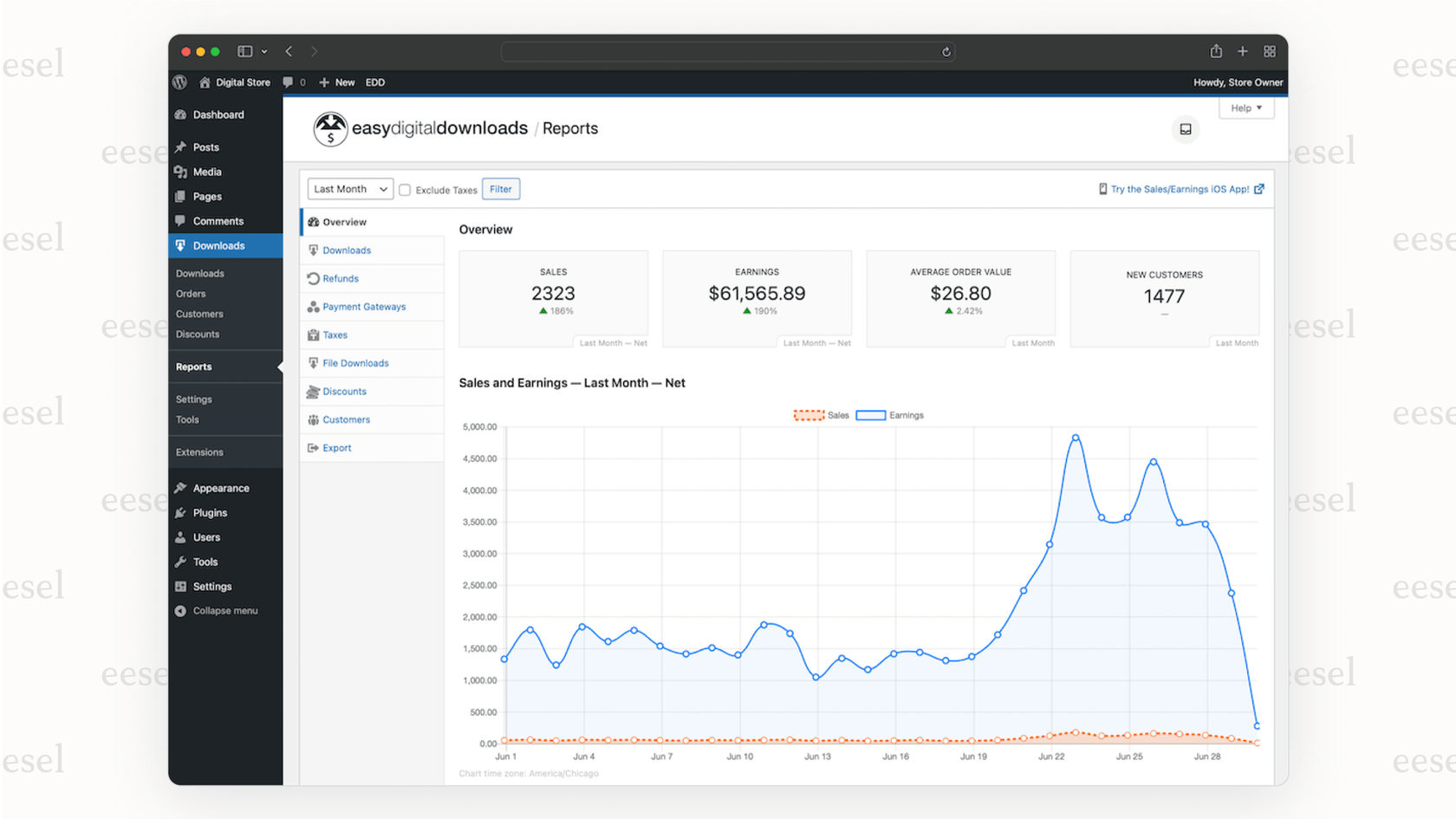
Making support smarter with AI: Selling digital products often brings questions about licensing, download problems, or how to use the product. eesel AI's Internal Chat can be trained on your technical docs, guides, and license terms. This gives your support team a private expert inside Slack or MS Teams, letting them find accurate answers in seconds and get back to customers faster.
7. Ecwid
Ecwid is a bit different. It can be used to create a standalone store, or it can be embedded into any existing website, social media profile, or online marketplace. This makes it incredibly versatile if you already have a site or a following and just want to add a "buy" button without starting from scratch.
Best for: Businesses with an existing website or a strong social media presence who want to add ecommerce easily.
Key features:
- Add a store to any site by just pasting a few lines of code.
- Your inventory syncs everywhere you sell (your site, Instagram, Amazon, etc.).
- A mobile app for managing your store on the go.
- It’s compatible with all major website builders like WordPress and Wix.
Pricing: A free plan for up to 5 products is available, with paid plans starting at $19 per month.
Making support smarter with AI: Because Ecwid lets you sell everywhere, your customer questions can come from everywhere, too. eesel AI can pull knowledge from all your different help centers, docs, and even past conversations in help desks like Intercom. This lets you use a consistent AI Chatbot or AI Copilot across all your channels, so customers get the right answer no matter where they find you.
8. Adobe Commerce
Adobe Commerce is an enterprise-level, open-source platform known for its raw power and flexibility. It’s built for big businesses with complex product catalogs, multiple brands, and global sales needs. It's the definition of a heavy-hitter.
Best for: Large, established ecommerce brands that need deep customization and have the development team to manage it.
Key features:
- It handles huge product catalogs and high-volume traffic without breaking a sweat.
- An advanced B2B suite with features like custom pricing, quotes, and different roles for business customers.
- AI-powered product recommendations and content personalization.
- It integrates smoothly with the rest of the Adobe Experience Cloud tools.
Pricing: The open-source version is free to download, but the costs of implementation and maintenance are significant. The hosted cloud version is quote-based and typically starts over $30,000 per year.
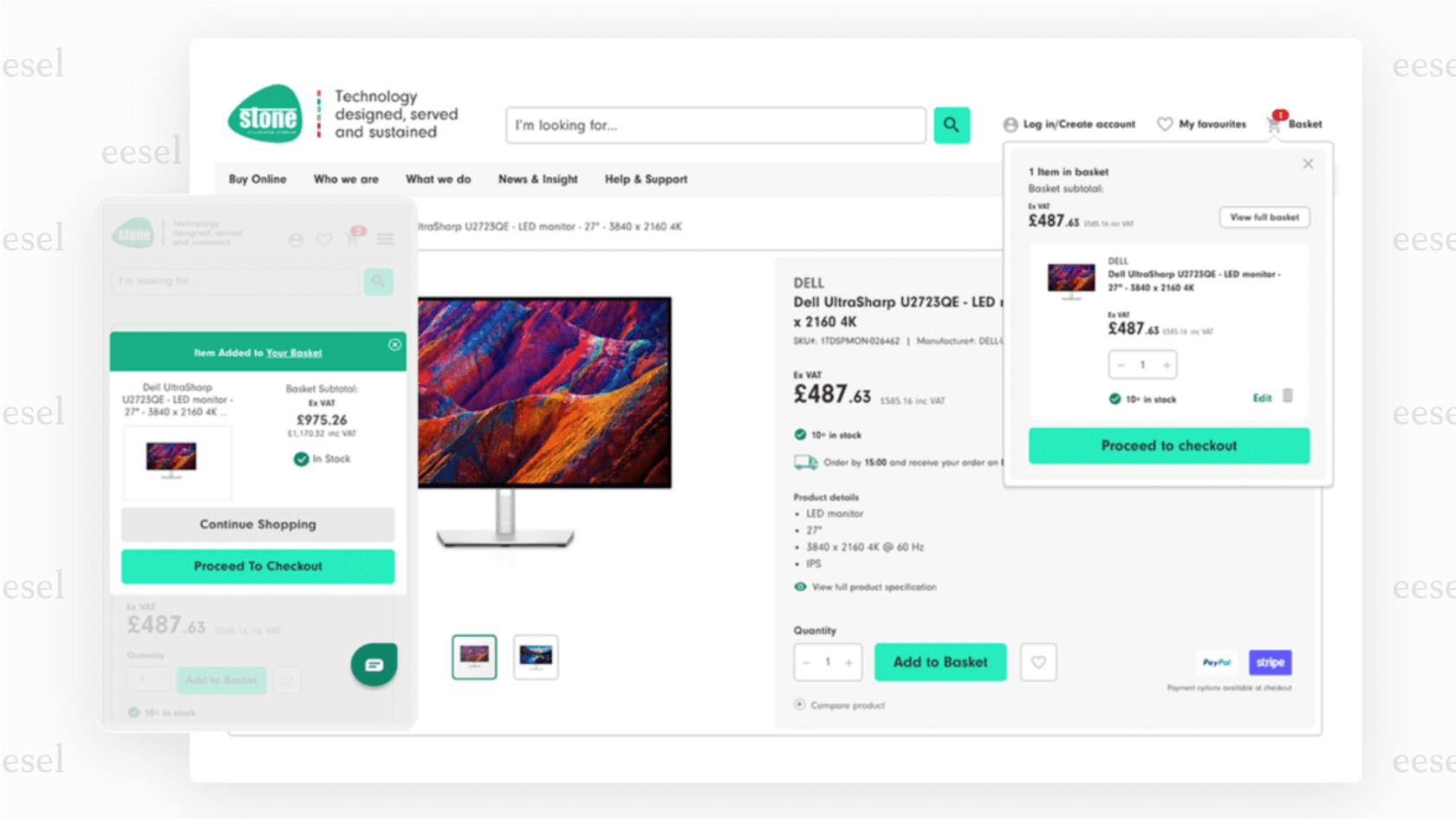
Making support smarter with AI: The complexity of Adobe Commerce usually means you need a pretty sophisticated support team. This is where eesel AI's AI Agent can be a huge help. It integrates with enterprise help desks like Zendesk and can be set up with complex business rules and API actions. It can handle tiered support, automate how tickets are sorted, and resolve common issues on its own, matching the enterprise scale of the platform.
9. PrestaShop
PrestaShop is a popular open-source ecommerce platform, especially in Europe. It's self-hosted and free to download. It has a solid set of features out of the box and really shines with its support for international selling.
Best for: Merchants who want full control over their store, plan to sell internationally, and are comfortable with some technical work.
Key features:
- It’s free and open-source, which means you have full ownership of your store's code.
- Built-in support for over 75 languages and multiple currencies.
- Detailed control over complex tax rules and shipping logic.
- A large marketplace with over 5,000 modules and themes to extend its functionality.
Pricing: The software is free; your costs will be for hosting, themes, and any paid modules you choose.
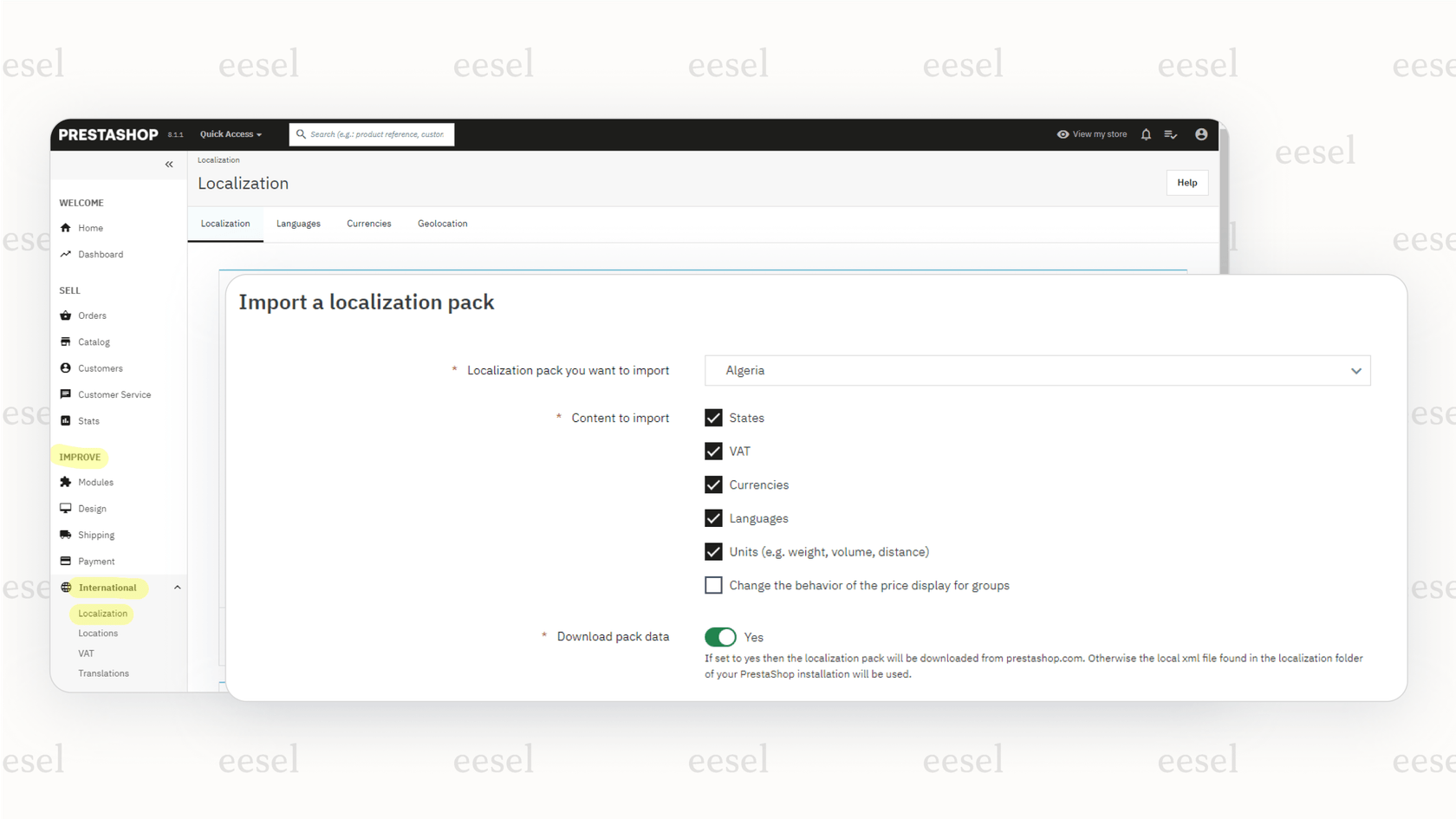
Making support smarter with AI: Selling to a global audience means you need to support them in their own language. eesel AI is multilingual out of the box, so you can set up an AI Chatbot or AI Agent that can talk to customers in their native language. By training it on your knowledge base, you can provide consistent, 24/7 support across all time zones ,a must for any international brand.
10. Square Online
Square Online is the ecommerce platform from the payment company, Square. It's built to seamlessly connect your online sales with your in-person sales through Square’s POS system. This makes it a perfect fit for brick-and-mortar businesses moving online.
Best for: Restaurants, retailers, and service providers who already use Square POS and want one system for their online and offline sales.
Key features:
- A free plan that lets you list an unlimited number of products.
- Your inventory automatically syncs between your online store and your Square POS.
- Tools for local delivery, in-store pickup, and standard shipping.
- Integration with Afterpay for "buy now, pay later" options.
Pricing: A great free plan is available, with paid plans starting at $29 per month.
Making support smarter with AI: When you manage both online and offline sales, customers have questions about both. The eesel AI Chatbot can be trained on your store hours, locations, online return policies, and product stock. This lets it answer a huge range of questions on your website, handling the easy stuff and freeing up your staff to focus on in-person customers and more complex issues.
How to choose the right WooCommerce alternative
There’s no single "best" platform ,the right one is the one that fits your business. To figure that out, ask yourself a few honest questions:
- How technical are you? If you don’t want to mess with hosting and security updates, a SaaS platform like Shopify or BigCommerce is your best bet. If you want total control and know your way around a server, a WordPress plugin or an open-source tool might be right for you.
- What's your real budget? Look at the complete picture: monthly fees, transaction costs, and what you might spend on themes and apps. A "free" plugin can get expensive once you start buying all the necessary add-ons.
- What are you selling? If you're only selling digital goods, a specialized tool like Easy Digital Downloads is much more efficient. For physical products with lots of variations, platforms like Shopify or BigCommerce are built for that.
- Where are you headed? Pick a platform that can grow with you. Think about future needs like selling internationally, adding B2B features, or managing inventory across multiple warehouses. Don't pick a platform you'll outgrow in a year.
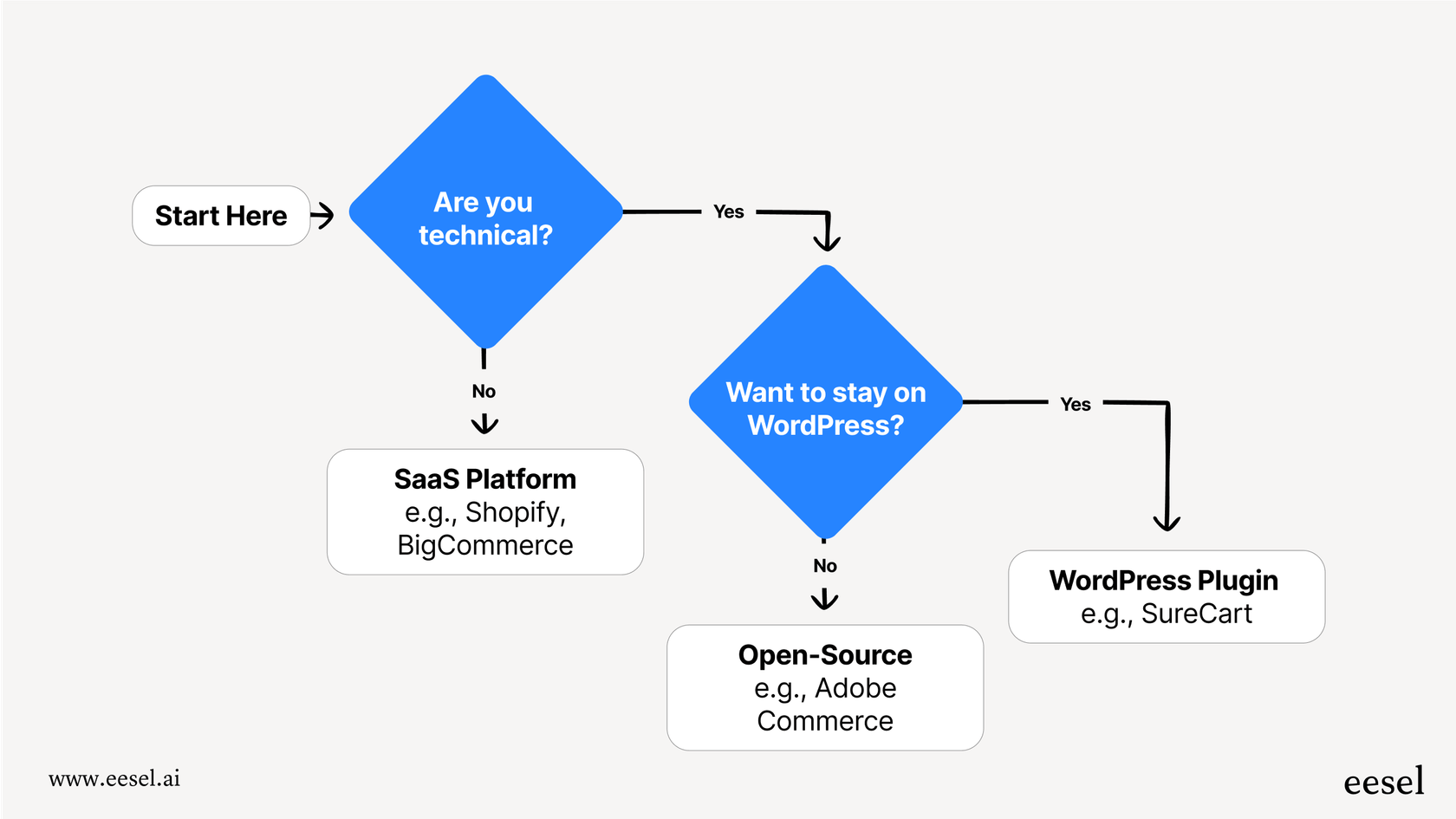
The final verdict: Build your store, then power it with AI
Choosing the right ecommerce platform is a huge first step. It all comes down to your goals, budget, and how much tech you want to handle. Whether you go with a hosted giant like Shopify, a nimble WordPress plugin like SureCart, or an open-source powerhouse, your job isn't over when the site goes live.
Every online store, no matter the platform, eventually runs into the same challenge: delivering great customer service at scale. This is where you can add an intelligent layer on top of your chosen platform to make it smarter.
It's not about replacing your store; it's about upgrading its ability to help your customers. Ready to see how it works? Try eesel AI for free or book a demo and discover how our AI Agent and Chatbot can automate your support and make your customers happier.
Frequently asked questions
Hosted platforms like Shopify, Wix, and Squarespace are your best options because they handle all the technical maintenance for you. Their intuitive drag-and-drop editors allow you to build and manage your store without needing to worry about hosting or security.
For high growth, you should look at robust SaaS platforms like BigCommerce and Shopify, as they are specifically designed to handle large-scale operations. For ultimate control and customization, an enterprise-level platform like Adobe Commerce is also a top choice for scalability.
Yes, you can absolutely stay on WordPress. Plugins like SureCart and Easy Digital Downloads are built as modern replacements for WooCommerce, offering a more streamlined experience without the common frustrations of plugin bloat.
The biggest risk is not redirecting your old URLs correctly, which can hurt your search rankings. You must implement 301 redirects for all your old product and category pages to point search engines to their new location on the new platform.
With hosted platforms like Shopify, the company handles all technical maintenance, security, and updates for a monthly fee, making daily management simpler. With a self-hosted option, you have more freedom but are fully responsible for all of those technical tasks yourself.
Share this post

Article by
Stevia Putri
Stevia Putri is a marketing generalist at eesel AI, where she helps turn powerful AI tools into stories that resonate. She’s driven by curiosity, clarity, and the human side of technology.





